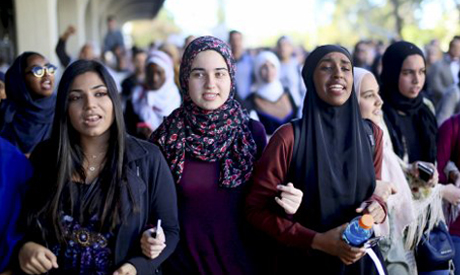
Students chant while marching at a rally against Islamophobia at San Diego State University in San Diego, California, November 23, 2015 (Photo: Reuters)
Donald Trump's call for a ban on Muslims entering the United States has been vehemently condemned by religious leaders, the White House and rivals on the presidential campaign.
Activists say Muslim Americans have suffered an unprecedented backlash since last month's Paris attacks, compounded since a couple said to have been radicalized shot dead 14 people in California last week.
Here are facts about the Muslim population in the United States:
There is no reliable data because the US Census does not collect information about religious background.
Pew Research Center estimates Muslims make up less than one percent of the adult population in the United States.
A 2011 survey found 2.75 million Muslims of all ages. Pew projects that by 2050, they will make up 2.1 percent of the population, surpassing Jews as the second-largest faith group.
Community activists say numbers are much larger, but estimates vary wildly.
The Council on American-Islamic Relations (CAIR) believes there are six to seven million. The US population is roughly 320 million.
The Muslim American community is one of the most diverse in the country. Polls say more than 60 percent are foreign-born. Arabs, South Asians and African Americans are the largest groups.
According to Pew, more than a third are born in the United States and that Muslim immigrants come from 77 countries.
Pakistan is the largest country of origin. Arab countries account for 41 percent of foreign-born American Muslims and South Asia around a quarter, according to Pew.
The rest are from Africa, Europe and elsewhere. Around 60 percent of native-born US Muslims are African Americans.
Muslims live across the United States, but the largest communities are in New York, Los Angeles, Chicago and Detroit.
The 10 states with the largest Muslim populations are California, New York, Illinois, New Jersey, Indiana, Michigan, Virginia, Texas, Ohio and Maryland.
The US government says there are also established communities near state universities, which often have sizable numbers of foreign-born Muslim students and faculty.
According to a CAIR survey of American Muslims conducted in 2012, 70 percent of respondents had a college or graduate degree -- above the US average.
Muslim Americans can be socially conservative but polls suggest 70 percent lean towards the Democratic Party and 10 percent to the Republican Party.
According to the CAIR survey, 35 percent of respondents said they experienced religious or ethnic profiling or discrimination after the 9/11 attacks.
According to Pew in 2011, 48 percent of US Muslims believe their religious leaders had not done enough to speak out against Islamist extremists.
Half of those polled in the 2012 CAIR survey said they go to mosque at least one a month.
Pew found that 96 percent of US Muslims believe in God and 65 percent report praying every day, making them roughly as religious as US Christians, but less religious than Muslims in many other countries.
Short link: